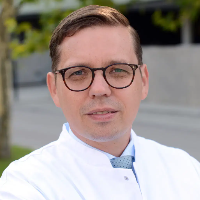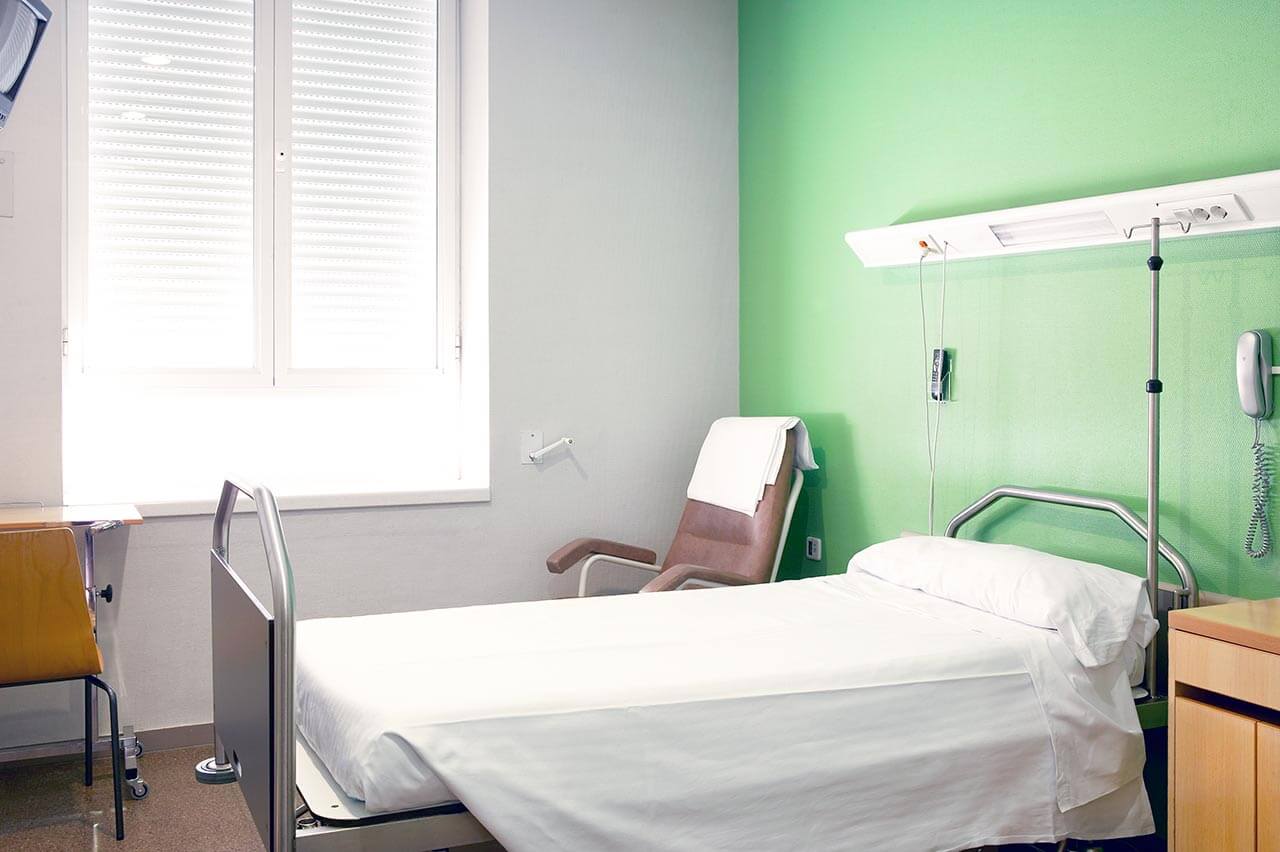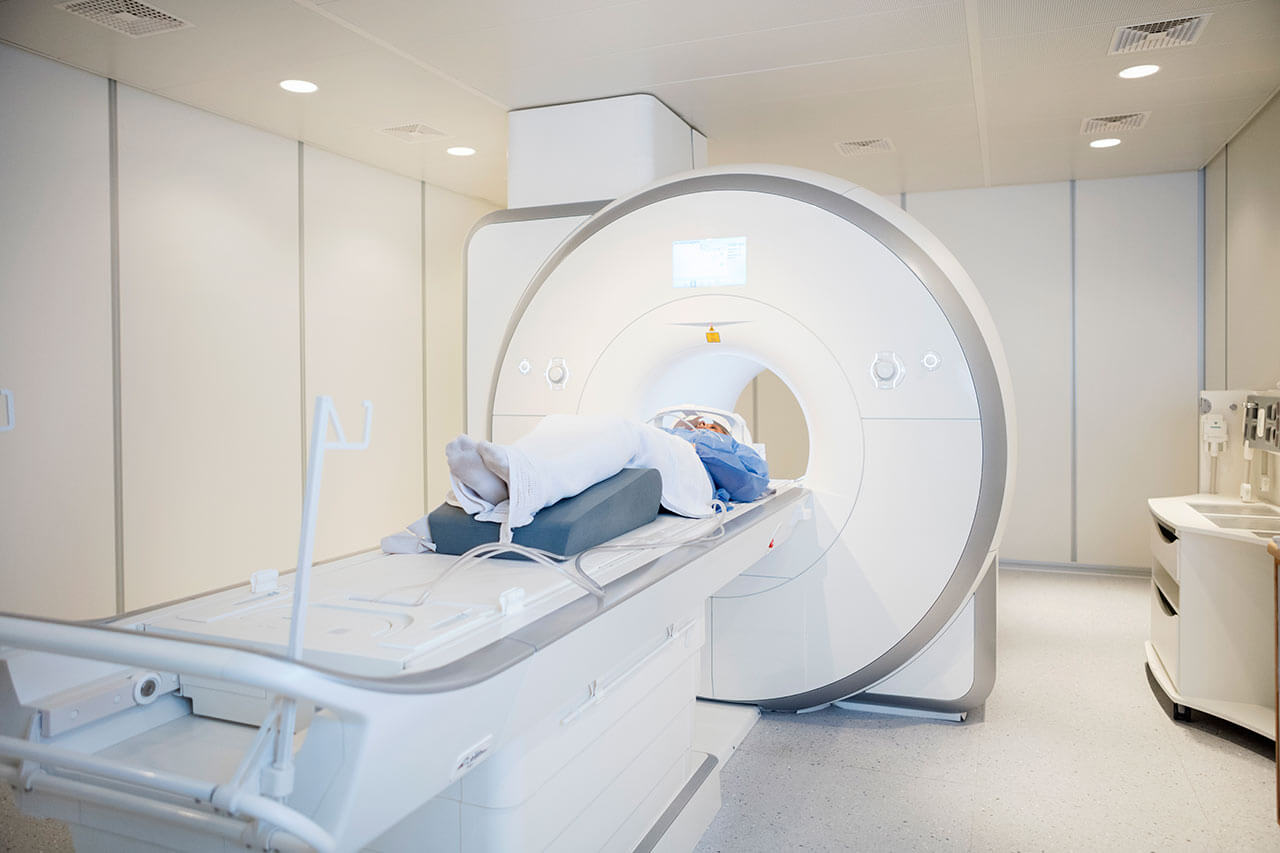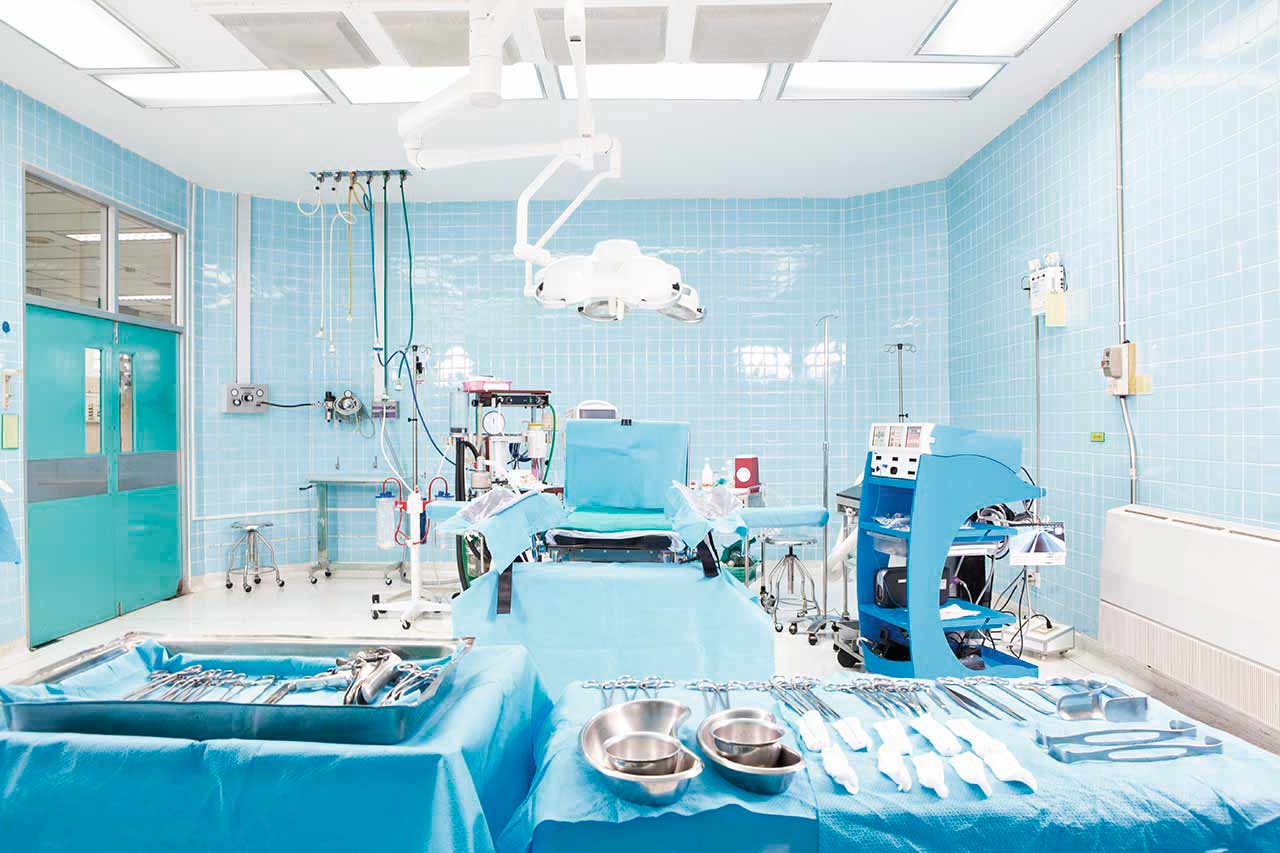
The program includes:
- Initial presentation in the clinic
- clinical history taking
- physical examination
- review of medical records
- laboratory tests:
- complete blood count
- biochemical analysis of blood
- TSH-basal, fT3, fT4
- indicators of inflammation (CRP, ESR)
- indicators blood coagulation
- otorhinolaryngological examination:
- Dix-Hallpike testing
- nystagmus testing:
- spontaneous nystagmus
- positional nystagmus
- artificial nystagmus testing
- speech audiometry
- tympanometry
- eustachian tube testing
- testing of blood pressure and buzzing
for tinnitus examination - otoacoustic emission test
- brainstem audiometry
- VEMP testing
(Vestibular evoked Myogenic Potential) - video head impulse testing
- eye movement testing
- CT of petrous pyramid
- contrast-enhanced MR
imaging on labyrinth in 3D
- preparation according to preoperative standard
- replacement of the stapes bone
of the middle ear with titanium implants - symptomatic treatment
- control examinations
- the cost of essential medicines and materials
- nursing services
- full hospital accommodation
- explanation of future recommendations
- written statement
Required documents
- Medical records
- Audiometry, tympanometry (if available)
- Temporal bone CT scan (if available)
Service
You may also book:
 BookingHealth Price from:
BookingHealth Price from:
About the department
165 Booking Health patients have already received treatment in the Department of Adult and Pediatric Otolaryngology at the University Hospital of Ludwig Maximilian University of Munich.
98% of patients recommend this hospital and department.
You can read reviews about the quality of the Booking Health service here.
The Department of Adult and Pediatric Otolaryngology at the University Hospital of Ludwig Maximilian University of Munich offers the full range of services in this medical field. The priority focuses of the department's clinical practice include the treatment of hearing impairment and hearing loss, diseases of the nasal cavity, paranasal sinuses, and skull base, as well as speech, voice, and swallowing disorders, and dizziness. The team of ENT doctors at the medical facility successfully copes with the treatment of malignant head and neck neoplasms. In cooperation with plastic surgeons, the department performs several types of facial plastic surgery, including rhinoplasty, otoplasty, blepharoplasty, scar revision, wrinkle treatment with Botox, and autologous adipose tissue injections. Thanks to outstanding specialists in their field and state-of-the-art medical equipment, the department is one of the leading medical facilities of this kind in Germany. The department has 102 beds and two large outpatient clinics. All diagnostic and therapeutic measures meet current national and international standards. Surgical interventions are performed using laparoscopic, endoscopic, and microsurgical techniques. The department is headed by Prof. Dr. med. Martin Canis.
The department successfully conducts diagnostics and treatment of hearing, speech, voice, and swallowing disorders in adults and children. A highly specialized AUDIOMUC Center was created here for this purpose. The specialists at the center carry out ENT examinations to detect pathological changes, after which they prescribe the most effective treatment. Drug therapy is preferred whenever possible, while surgery is the last-line treatment. A special focus of the AUDIOMUC medical team is regular check-ups and monitoring of patients with previously implanted hearing aids and cochlear implants. The specialists also perform cochlear implantation for adults and children. Today, cochlear implantation is a true medical breakthrough that allows for the treatment of the most complex forms of hearing loss, including unilateral hearing loss.
An integral part of the work of the department's ENT doctors is the treatment of nose and paranasal sinus pathologies. Patients with difficulty nasal breathing often seek medical help from the department. The reason for this may be enlarged turbinates, for example, due to an inflammatory process. The diagnostic stage involves endoscopic procedures and rhinomanometry. Radiofrequency procedures or laser interventions can be performed (on an outpatient basis) to eliminate the pathology. Difficulty nasal breathing can also be caused by a deviated septum. In this case, the department's specialists perform a septoplasty (with minimally invasive techniques), which makes it possible to eliminate not only breathing problems but also some aesthetic defects.
The medical facility also provides the full range of diagnostics and treatment for malignant head and neck tumors: cancer of the oral cavity, pharynx, larynx, and paranasal sinuses, as well as malignant neoplasms of the skin of the head and neck and malignant tumors of the salivary glands. Patients with head and neck cancers are treated in cooperation with the specialists from the Comprehensive Cancer Center Munich and the Department of Oral and Maxillofacial Surgery. To achieve a good therapeutic result, surgical resection of the malignant tumor is usually required. The team of the department's doctors works in state-of-the-art operating rooms adapted for operations of any complexity. They have technical options for microsurgical, laser, and robot-assisted interventions. The primary goal of doctors is to completely remove the tumor, but it is also important to ensure a satisfactory aesthetic result, and therefore, if necessary, reconstructive plastic surgery may be performed. It should be noted that small head and neck tumors in the early stages are removed mainly with the help of laser techniques. Cancer treatment also often includes chemotherapy and/or radiation therapy, as well as other types of conservative therapy.
The department's range of medical services includes the following:
Diagnostics and treatment of hearing impairment in adults and children |
|
| Diagnostics and treatment of dizziness and balance disorders |
|
| Diagnostics and treatment of nose and paranasal sinus diseases |
|
| Diagnostics and treatment of speech, voice, and swallowing disorders in adults and children |
|
| Diagnostics and treatment of allergies |
|
| Diagnostics and treatment of benign and malignant head and neck tumors |
|
| Diagnostics and treatment of skull base diseases |
|
| Diagnostics and treatment of salivary gland diseases |
|
| Diagnostics and treatment of snoring and sleep-related breathing disorders in adults and children (within an interdisciplinary Sleep Laboratory) |
|
| Diagnostics and treatment of Osler-Weber-Rendu disease |
|
| Plastic aesthetic surgery of the head, face and neck |
|
Other medical services |
Curriculum vitae
After studying human medicine at the Ruprecht Karl University of Heidelberg and clinical practice at the University of Vienna, Baylor College of Medicine in Houston, and the University of St. Gallen, Prof. Dr. med. Martin Canis became an Intern and Research Fellow at the Ludwig Maximilian University of Munich in 2004. In 2010, he was appointed the Acting Head Physician in the Department of Adult and Pediatric Otolaryngology.
In 2009, Prof. Canis has his board certification, followed by additional qualifications in Allergology, Healthcare Quality Management, Plastic and Aesthetic Surgery.
In 2011, Prof. Canis received an offer to hold the position of W2 Professor at the University of Munich, which he refused. In the same year, he moved to the University of Goettingen, where he held the position of Head of the Section of Oncology, Reconstructive Surgery and Allergology, and since 2014, he was appointed as the Acting Head of the Department of Otolaryngology.
Then he received three offers to hold positions in the departments at the Universities of Goettingen, Regensburg, and Munich. In 2016, Dr. Canis accepted the offer to hold the position of Head of the Department of Adult and Pediatric Otolaryngology at the University Hospital of Ludwig Maximilian University of Munich.
Prof. Canis is the author of more than 100 works, many of which are published in the respected and reputable international professional journals, which testifies about his outstanding scientific knowledge.
In addition, Prof. Dr. med. Martin Canis holds many awards and prizes. In particular, he was awarded Johannes Zange Prize for the publications from the North-German Society of Otorhinolaryngology, Head and Neck Surgery, as well as Meyer-zum-Gottesberg Prize for Audiology Research from the German Society for Audiology.
In 2013, Prof. Canis received a Scholarship from the German Society of Otolaryngology, Head and Neck Surgery, thanks to which he gained an invaluable experience at the Center for Skull Base Surgery at the Loyola University in Chicago (USA). Here the doctor had a unique training in Highly Specialized Surgical and Microsurgical Interventions.
Photo of the doctor: (c) LMU Klinikum
About hospital
According to the Focus magazine, the University Hospital of Ludwig Maximilian University of Munich is regularly ranked among the best medical institutions in Germany!
The hospital is the largest multidisciplinary medical facility, as well as a leading research and training center in Germany and Europe. The hospital is proud of its bicentenary history and tirelessly confirms its primacy at the national and international levels. The outstanding quality of medical care is complemented by highly productive research activities, thanks to which many effective diagnostic and therapeutic methods, saving people’s lives, have been presented in medical practice.
The medical facility includes two main buildings, Grosshadern and Innenstadt. The hospital has 29 specialized departments, 53 interdisciplinary centers, 11 institutes, and many sections. More than 500,000 patients are treated here every year, which indicates the hospital's excellent reputation. A large and highly professional medical team, consisting of 1,800 doctors and 3,300 nursing staff, works for the benefit of patients. The hospital has 2,000 beds to accommodate patients.
The hospital's infrastructure deserves special attention: advanced diagnostic equipment that allows doctors to detect the slightest pathological changes in the human body, the latest operating rooms with highly efficient monitoring systems, robot-assisted surgical systems that facilitate sparing operations, and proper postoperative care.
Excellent technical resources and highly professional medical staff are undoubtedly the hospital's pride, but the medical facility also pays attention to the patient's comfort and to a humane attitude toward their life situation. When providing the necessary medical care, doctors and nursing staff always show a friendly attitude, inform patients in detail about the upcoming diagnostic and therapeutic procedures, gladly answer all questions of interest to patients, and provide moral support during the therapeutic process.
The hospital has many prestigious quality certificates, including a DIN EN ISO 9001 certificate, an IQM certificate, an endoCert certificate, certificates from the German Cancer Society (DKG) for treating various types of cancer, the German Cardiac Society (DGK), the German Society for Orthopedics and Trauma Surgery (DGOU), etc. Thus, patients can count on the best possible treatment outcome due to the use of the most effective and, at the same time, sparing therapeutic techniques.
Photo: (с) depositphotos
Accommodation in hospital
Patients rooms
The patients of the University Hospital of Ludwig Maximilian University of Munich live in comfortable, spacious, single and double patient rooms with a modern design. Each room is equipped with an ensuite bathroom with a shower and toilet. The furnishing of a standard patient room includes a comfortable bed, the position of which can be adjusted using the remote control, a locker for storing personal belongings, a TV, and a telephone. Also, if desired, you can connect to the Internet. In addition, patients can opt for enhanced-comfort rooms, with a safe, a fridge, and upholstered furniture.
The hospital has an excellent infrastructure. The medical facility’s area houses a bank, ATMs, a hairdresser, shops with a wide range of food, drinks, newspapers, magazines, and personal hygiene items, play areas for children, and a beautiful garden for walking, etc.
Meals and Menus
The patient and his accompanying person are offered a daily choice of three menus, including a vegetarian one. If you are on a specific diet for any reason, you will be offered an individual menu. Please inform the medical staff about your dietary preferences prior to the treatment.
Further details
Standard rooms include:
Religion
Religious services are available upon request.
Accompanying person
Your accompanying person may stay with you in your room or at a hotel of your choice during the fixed program.
Hotel
You may stay at a hotel of your choice during an outpatient program. Our managers will help you to choose the best option.
The hospital offers a full range of laboratory tests (general, hormonal, tests for infections, antibodies, tumor markers, etc.), genetic tests, various modifications of ultrasound scans, CT scans, MRI and PET/CT, angiography, myelography, biopsies, and other examinations. Treatment with medications, endoscopic and robotic operations, and stereotaxic interventions are carried out here, modern types of radiation therapy are also used. The hospital offers patients all the necessary therapeutic techniques.
- Allogeneic bone marrow transplantation
- Microsurgical transplantation of head and neck tissues
- Microsurgical resection of brain tumors with intraoperative fluorescence
- Minimally invasive treatment of spine pathologies
- Joint replacement with postoperative rehabilitation (fast track program)
Patients with benign and malignant neoplasms of various localizations, pathologies of arteries and veins, herniated discs, osteoporosis, congenital and acquired pathologies of the musculoskeletal system, benign and malignant pathologies of the mammary gland, and other pathologies.
Which specialties of the University Hospital of Ludwig Maximilian University of Munich are the best?
- Interventional and diagnostic neuroradiology
- Vascular surgery
- Cardiac surgery
- Mammalogy
- Gastroenterology and hepatology
Over 1,700 highly qualified doctors work at the hospital.





